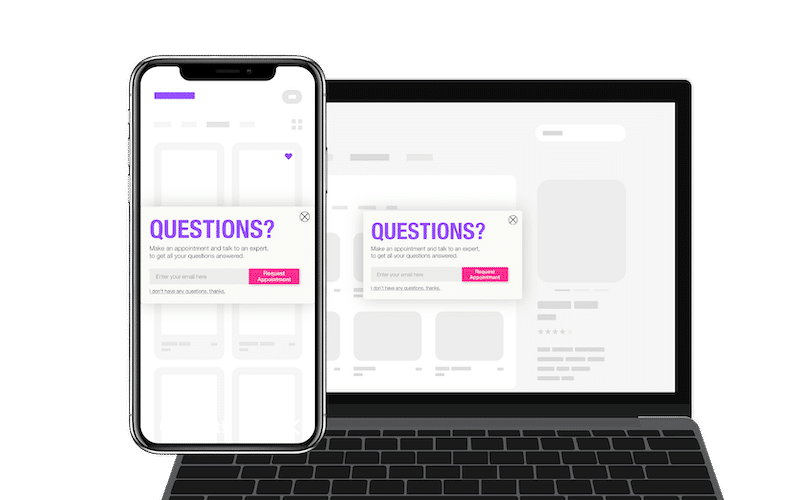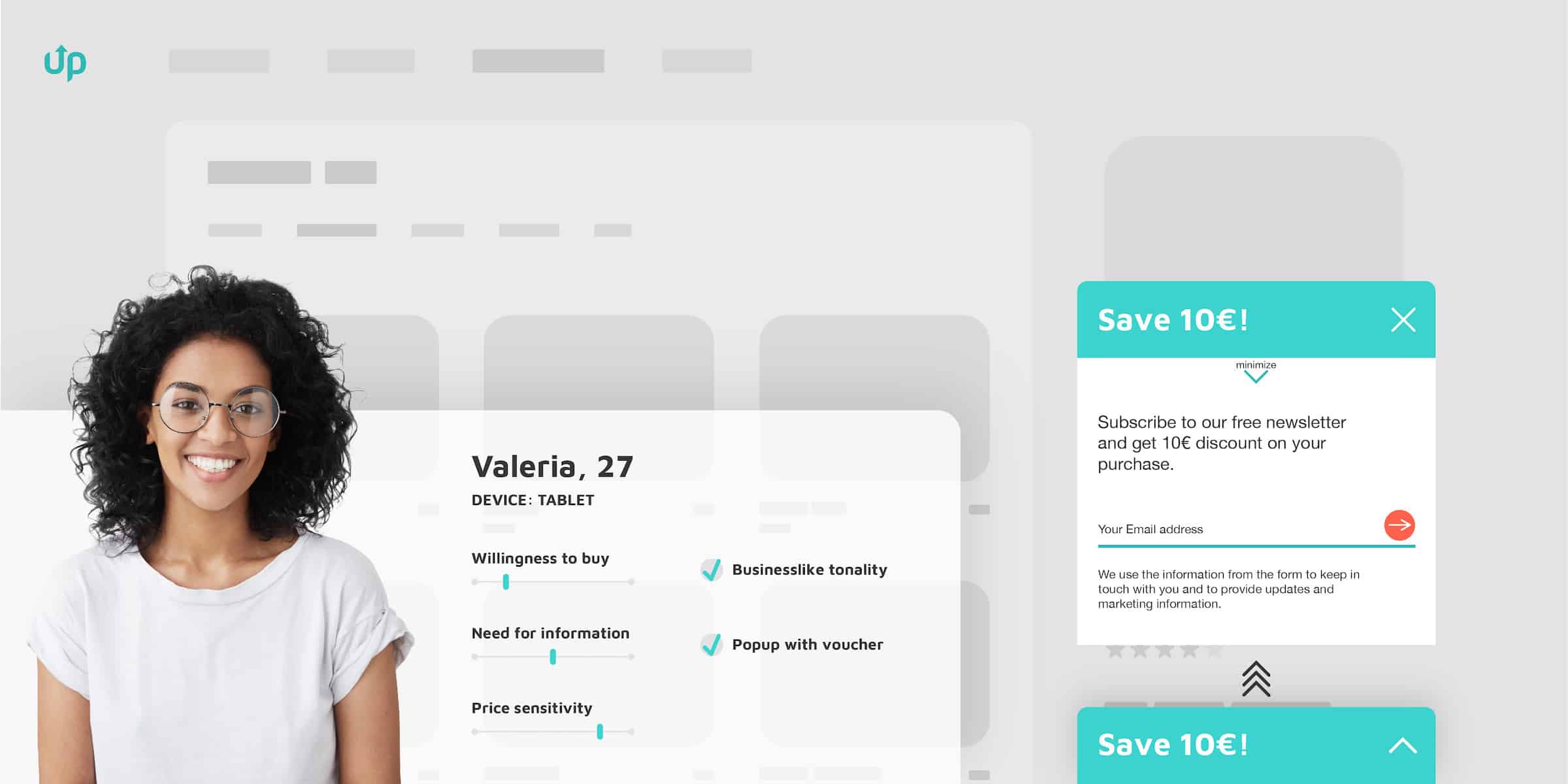Exit-Intent Popups: Boost Your Conversion Rate


Key Takeaways
Summary
Exit-intent popups detect when visitors are about to leave a website and present them with relevant offers or information at the right moment. When used effectively, they help prevent cart abandonment, re-engage potential customers, and sustainably increase revenue.
- Exit-intent popups reduce cart abandonment and increase conversion rates
- Success depends on targeted messaging, personalization, and behavioral analysis
- AI-powered popups optimize timing and content
- Must work seamlessly across all devices without disrupting the user experience
- Moderate frequency and relevant content are crucial
- Boost revenue and foster long-term customer loyalty

What Are Popups?
Popups are small dialog boxes or overlays that appear over a website’s content to draw the user’s attention to specific information or actions. An effective popup should include clear calls-to-action to encourage user interaction and increase the conversion rate. They are often used for marketing purposes, such as promoting newsletter sign-ups, displaying special discount offers, or prompting the customer to take a specific action. However, traditional popups can be perceived as intrusive, especially when they interrupt the user in the middle of the reading or purchase process.

What Does Exit-Intent Mean?
The term “Exit-Intent” refers to a technology that detects when a visitor is about to leave a website. This is usually done by tracking the mouse cursor on desktop devices or specific touchscreen interactions on mobile devices, such as tapping the “back” button or switching tabs. Once such behavior is detected, the exit-intent popup is triggered to engage the user with relevant information or incentives to encourage them to stay on the site.
These popups are specifically designed to take advantage of the final moments of user interaction to increase the likelihood of a micro conversion before the visitor leaves the page. This approach avoids the annoyance factor often associated with traditional popups, as it only appears when the user is already about to leave the site. This subtle, targeted approach creates a much better user experience, higher acceptance, and improved conversion rates.
Statistics on Exit-Intent Popups
Millions of websites and online shops worldwide use exit-intent popups to convert abandoning visitors at the last moment. While exact percentages for all websites are unavailable, industry-specific data shows significant adoption: an estimated 60 %+ of online shops use such popups, and many content and corporate sites use them as well. Their popularity is driven by proven benefits – well-crafted exit popups can retain or recover up to ~15 % more customers or sales.
According to a recent Wisepops analysis, roughly two-thirds of Shopify-based online stores use some form of popup to engage visitors, most often to capture email addresses or prevent checkout abandonment. This makes popups one of the most common marketing tools on e-commerce websites.1 2
How Do Exit-Intent Popups Work?
We’ve all experienced it: You browse through a site, consume the content, and suddenly get interrupted by an annoying popup. Unlike other popup triggers, exit-intent popups avoid this annoyance factor. To understand how they differ from other types of popups — and why they have unique advantages — let’s take a closer look at the most common trigger mechanisms.

Different Popup Triggers Compared
Mouse-Out Trigger
The mouse-out trigger is the core technology behind exit-intent popups. It detects when a user moves the mouse toward closing the window or tab and displays the popup at precisely that moment. A clearly visible “close button” is essential to prevent user frustration. This button should be designed to be easily noticeable and clickable, ensuring a smooth closing process and improving the user experience.
Since mobile devices don’t have a mouse cursor, exit-intent popups work differently there: they are triggered when a user taps the “back” button, switches apps, or opens a new page. This targeted approach ensures that exit-intent popups don’t disturb the browsing experience but appear at exactly the right time.
Time-Delay Trigger
The time-delay trigger displays a popup after a predefined period, regardless of whether the user is still actively engaging with the page. The downside: this mechanism often interrupts the reading flow and can quickly be perceived as intrusive. Many users even leave a site because of such poorly timed popups — an effect that exit-intent popups are designed to avoid.
Scroll Trigger
The scroll trigger shows a popup once a user has reached a specific section of a page. This might seem logical, as it indicates the user is showing interest. However, it still interrupts the browsing flow, and users might feel disturbed, especially if they are currently examining a product or reading an article. Exit-intent popups, in contrast, allow users to explore freely and only intervene when they are about to leave the page.
Achieve Success with Exit-Intent Popup Technology
Thanks to exit-intent technology, website owners can strategically use popups without coming across as annoying. By tailoring the exit-intent popup content to the visitor’s individual needs, the conversion rate can be significantly increased. The key to this is combining exit-intent technology with an intelligent algorithm.
Do you already know our plugin?
uptain prevents cart abandonment and increases the conversion rate and repeat purchase rate. No risk with performance-based commission.
Benefits of Exit Popups
The use cases for exit-intent popups are diverse and always depend on the specific goal. Whether it’s an online store or a magazine/blog, website owners use exit-intent popup technology for different purposes.
1. More Conversions: Boost Sales
Every online store faces visitors who add products to their cart but don’t complete the purchase. With exit-intent popup technology, these cart abandoners can be converted into paying customers. Online stores achieve more conversions through the use of exit-intent technology—without annoying visitors and risking that they leave the website.
Since cart abandoners belong to a segment with very high purchase intent, exit-intent popups perform exceptionally well. At this point, exit-intent popups with personalized content can be deployed to persuade these visitors to complete their purchase. Depending on the visitor and the reason for abandonment, this could be an individual discount code or offering telephone, WhatsApp, or email support directly via the exit-intent popup.
More Conversions with the uptain® ALGORITHM
Watch the short explainer video to learn how AI-powered popups work:

Step 1: The visitor browses your online store for a while and eventually adds items to the shopping cart.
Step 2: In the background, the uptain® ALGORITHM works to detect the customer’s needs and the reason for potential abandonment, in order to prepare a personalized exit-intent popup.
Step 3: Just before the visitor abandons the purchase, a customized exit-intent popup appears, tailored to the individual customer, persuading them to complete the purchase.
3. Content Marketing with Exit-Intent Popups: Increased Dwell Time and More Interactions
Exit-intent popups help reduce the bounce rate by directing visitors to different content they can consume before leaving the site. Exit popups provide a last opportunity to convert visitors by grabbing their attention just as they’re about to exit – this could be through offering e-books, blog articles, or contests. This method can increase customer engagement as exit-intent popups not only boost dwell time but also improve the interaction rate.
The positive effects can be seen in several areas:
- Better Ranking: The longer a visitor stays on a website and the more interactions take place, the more likely it is that the site will rank higher on Google. This is because Google assumes the search intent has been satisfied when dwell time and interaction rates are higher.
- Happier Customers: The more interesting and especially relevant content your visitors consume, the more likely they are to remember your website positively. This increases the chances they’ll return repeatedly and eventually become a loyal customer.
Mobile-Compatible Exit-Intent Popup Technology

Online shopping on mobile devices is gaining wider acceptance, as numerous statistics confirm. In 2019, 58% of German online shoppers made at least one purchase on a mobile device. By 2020, this figure had already risen to 71%. All the more reason to rely on technologies that support the trend toward mobile commerce in order to reach as many cart and page abandoners as possible.
What does this mean for Exit-Intent Popups?
- Instead of mouse movement (mouse-out trigger) as on desktop, the back button, or a tab/app switch, signals to the exit-intent popup that the shopper is about to leave a filled shopping cart.
- Exit-intent popups – like those from uptain – must be compatible across all devices, whether on desktop, smartphone, or tablet. Specifically, this means compatible buttons as well as responsive exit-intent popup sizes.
Frequency: How Often Should Exit-Intent Popups Appear?
Even though exit-intent popups only appear when a visitor is about to leave the website, it’s important to consider the frequency of these notifications.
For example, if the visitor is a returning customer, you can safely assume they will visit the shop again soon. Exit-intent popups should therefore not appear too frequently, regardless of whether they are designed to generate newsletter subscribers, prevent cart abandonment, or direct visitors to interesting content. This ensures that exit-intent popups provide a subtle touchpoint that enhances the user experience.
Customer-centric exit-intent technologies work in the background to ensure that visitors are not repeatedly shown the same content. Furthermore – regardless of the content – no more than one exit-intent popup should appear in an online shop within a 24-hour period, as more frequent contact could come across as intrusive, which should, of course, be avoided.
Interested in learning more about mobile shopping cart abandonments? Read the blog post Mobile Shopping Cart Abandonment in Online Shops.
Frequently Asked Questions
What is an Exit-Intent Popup?
An exit-intent popup is an overlay that appears when a user is about to leave a website. It offers targeted incentives to encourage the visitor to stay or complete a purchase.
How does exit-intent technology work?
The technology detects mouse movements, scrolling behavior, or other actions that indicate a user is about to leave the page. A relevant, personalized popup then appears.
Why are exit-intent popups better than classic popups?
Unlike traditional popups, exit-intent popups do not disrupt the normal browsing flow. They only appear when a user intends to leave, making them less intrusive and more effective at improving conversion rates.
What content should be shown in an exit-intent popup?
The content should be personalized and tailored to the user’s behavior. Popular approaches include discount codes, exclusive offers, newsletter sign-ups, or relevant content like blog articles or e-books.
Do exit-intent popups work on mobile devices?
Yes. Mobile exit-intent popups use different triggers, such as tapping the “back” button or switching tabs. It’s important that they are responsive and work well on small screens.
Sources
1 Wisepops: Shopify Statistics: Onsite Engagement (2025), wisepops.com (accessed 13 June 2025)
2 Getsitecontrol: 15 Website Popup Statistics: Conversions and Click-Through Rates (2024), getsitecontrol.com (accessed 13 June 2025)
-
Conversion Optimisation at the Checkout: 10 Tips
The checkout takes a special role: It is the key step in the buying process and should therefore be designed with careful consideration. Online shops can reduce this last barrier before the purchase by implementing suitable optimisation measures. With these 10 tips, you can optimise your checkout process so that visitors become customers more easily.
-
Alpha Industries increase Orders by 10%
The company is looking for technical solutions that increase sales and establish the online shop stronger among the desired target group. The results: Growth of Newsletter Subscribers through Newsletter Popups by 20% compared to the normal Newsletter Form on the website, Increase in Orders by 10%, Increase in Newsletter Open Rate by 5%, Consistent overall image of the Corporate Identity.
-
How To Reduce Cart Abandonment and Win Back Abandoners
Are you annoyed by the many shopping cart abandoners in your online shop? About 70% of the filled shopping carts are abandoned. So there is a lot of potential here. In this guide you will learn everything there is to know about shopping cart abandoners: Identify reasons for abandonment, reduce shopping cart abandonment and satisfy customers.



